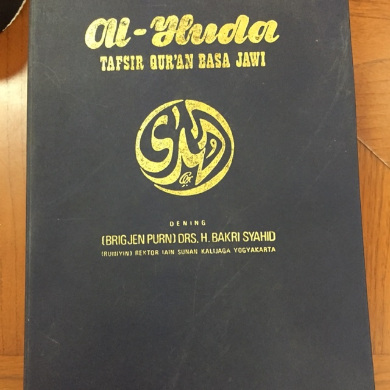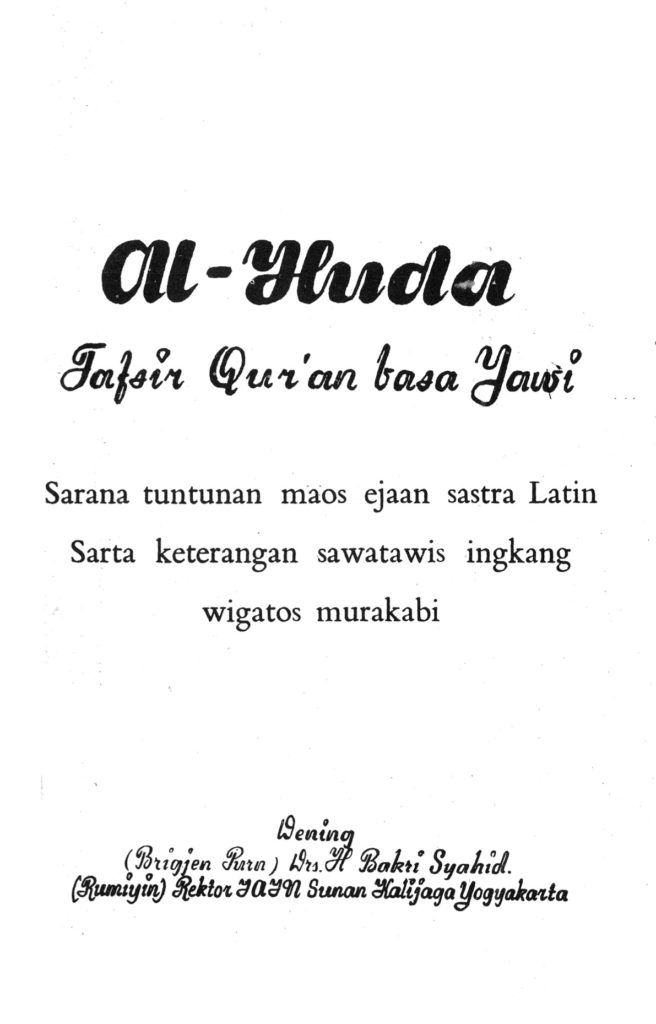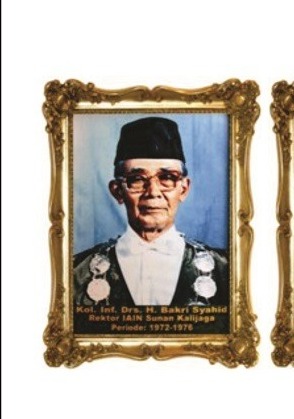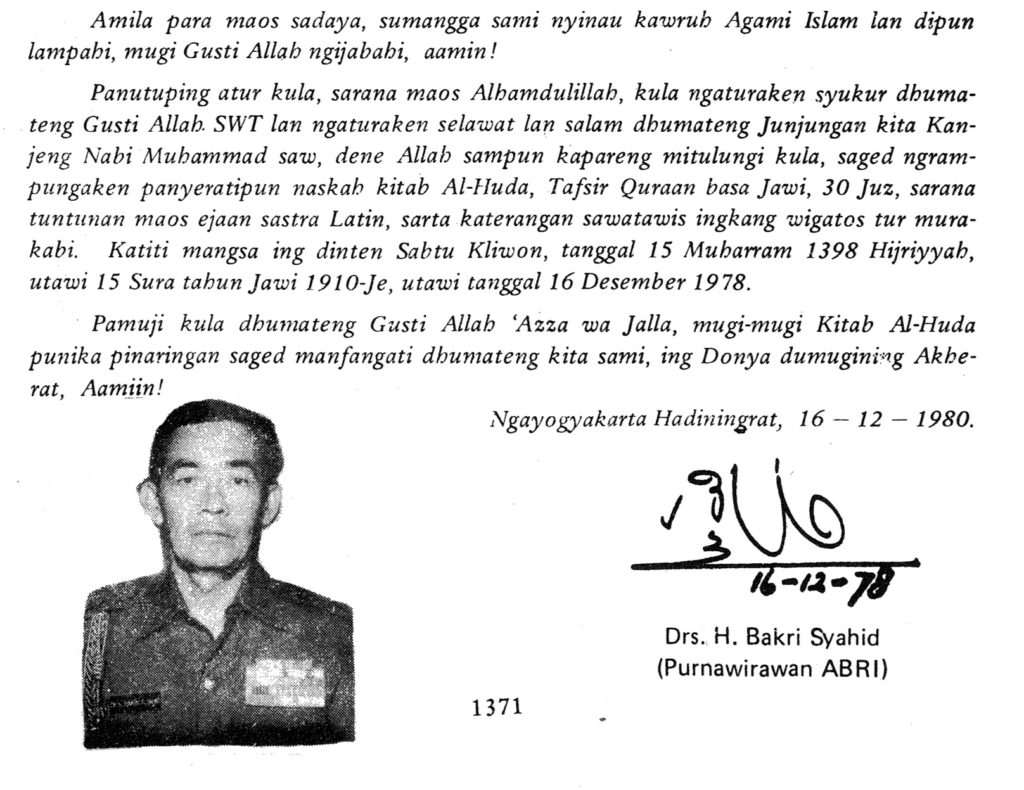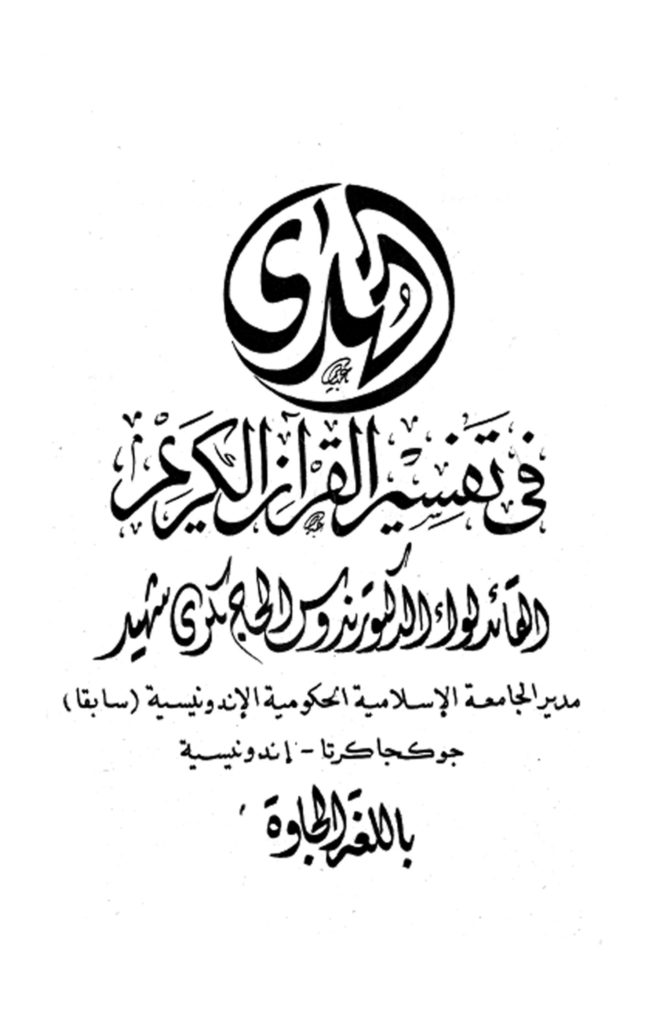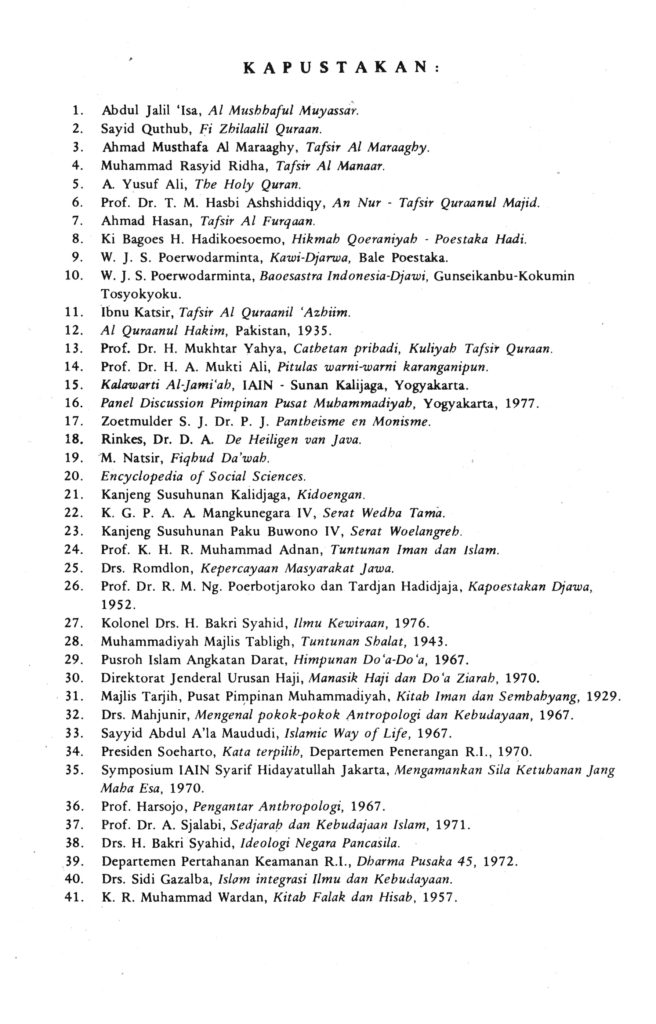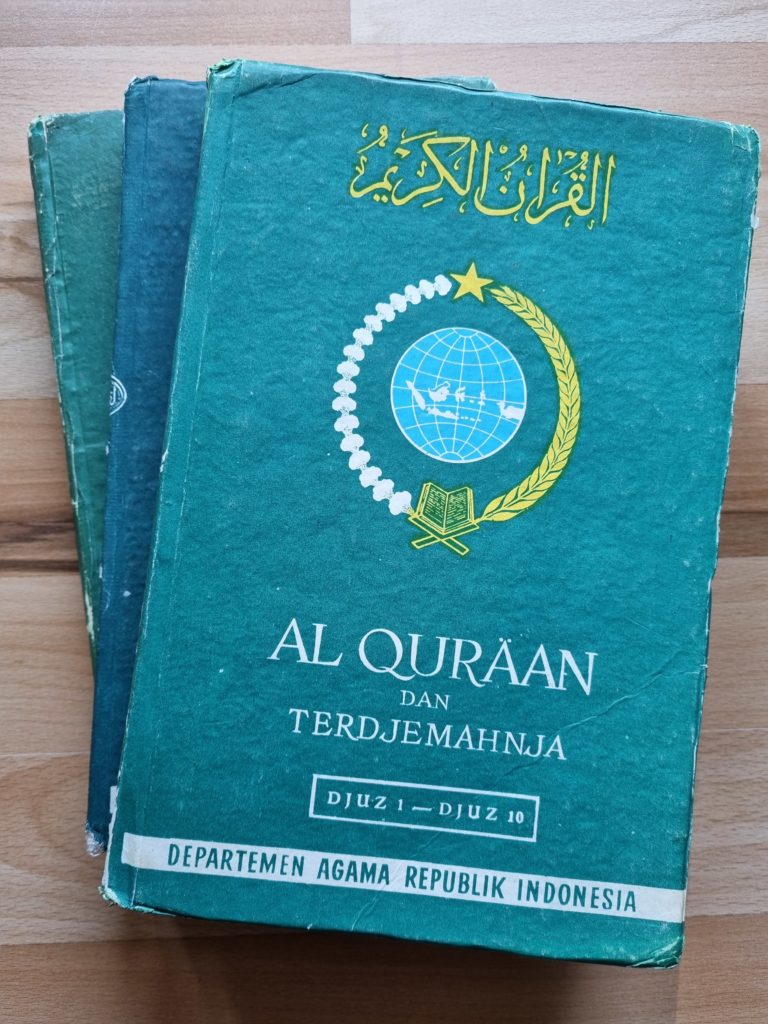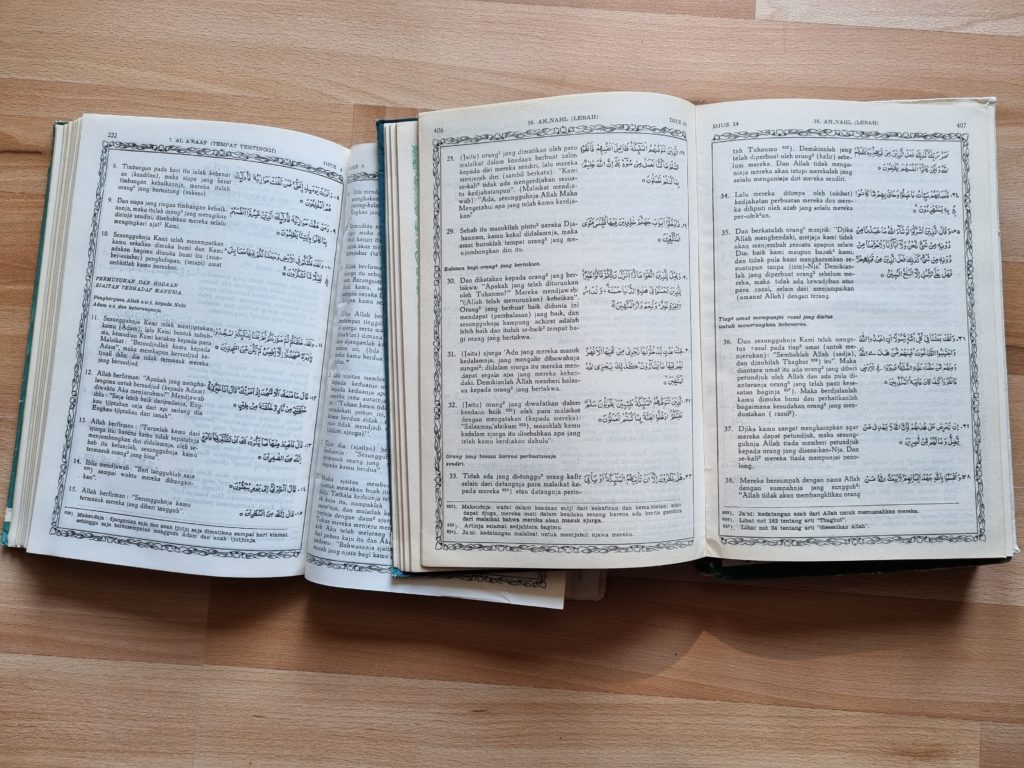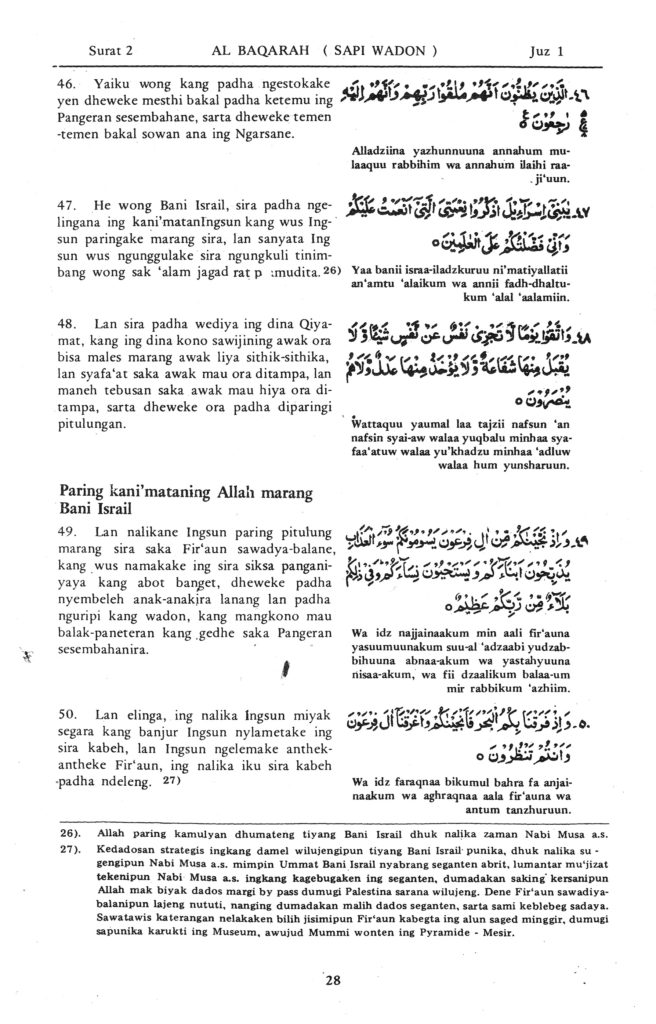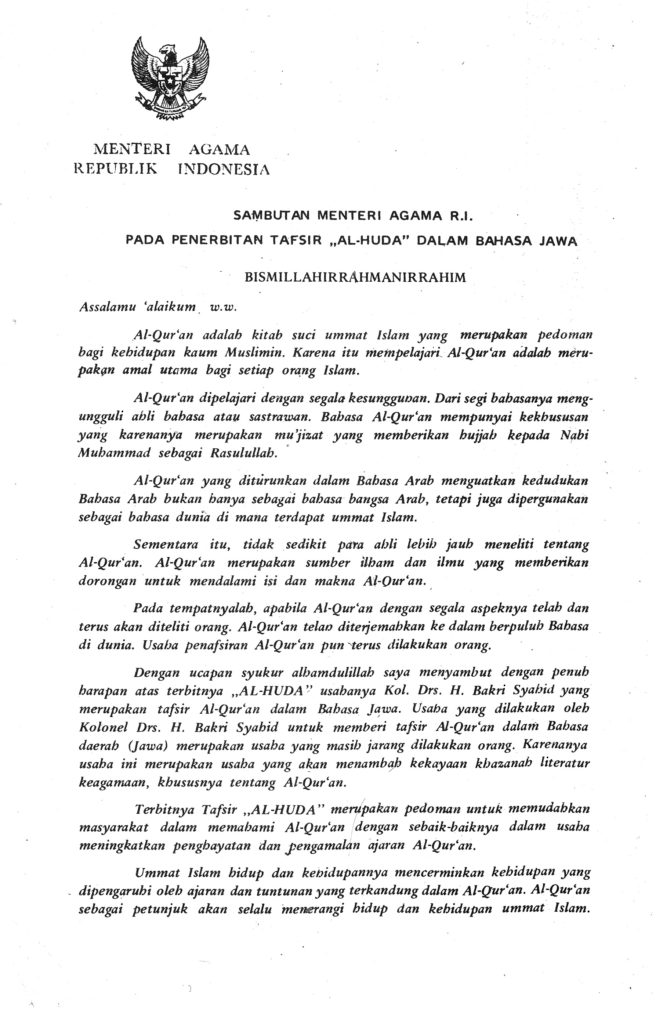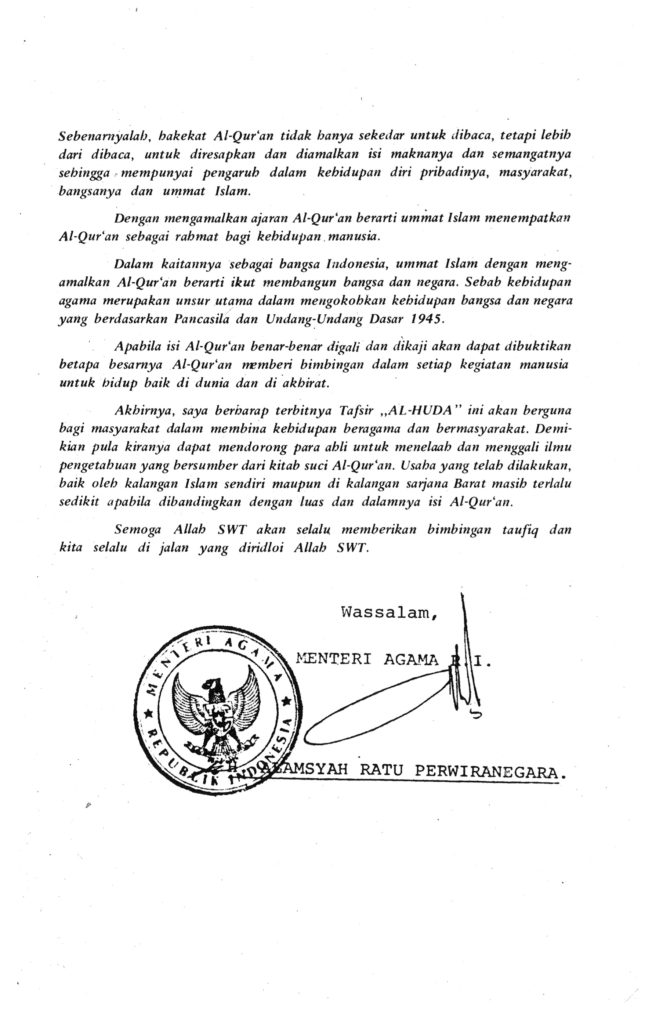Qur’an translation as propaganda: war alliances and nation-building (3/3)
On the cover of Al-Huda, a Javanese Qur’an translation first published in 1979, the author, Bakri Syahid (1918–1994), is presented as both a retired brigadier general and a former rector of the State Islamic Institute Sunan Kalijaga in Yogyakarta.
As this description shows, army and state were closely interlinked in this period of Indonesian history. Al-Huda is an attempt to establish Indonesia’s government and armed forces as organic components of an Islamic society and, conversely, Islam as an indispensable part of Indonesian statehood.
Bakri wrote Al-Huda at a time when the Indonesian state had already published its own official Qur’an translation in the Indonesian language, Al-Quräan dan terdjemahnja (https://gloqur.de/quran-translation-of-the-week-01-al-quran-dan-terjemahnya/), and this was the template on which Bakri based his own work. However, the government translation had been written by a team of religious scholars, whereas Bakri was first and foremost an army officer and state official, and it is maybe that background that led him to be explicitly propagandistic in his translation in a way that Al-Quräan dan terdjemahnja never was.
Consider, for example, his curious translation of, and commentary on, Q 61:11, an exhortation to the believers that contains the following phrase:
تُجَاهِدُونَ فِي سَبِيلِ اللَّهِ
Previous Indonesian translators had generally rendered this along the lines of “you [the believers] conduct jihad (berjihad) in the way of God” or “you struggle (berjuang)/ fight (Jav. perang) in the way of God.” They had clearly not thought that this phrase required further explanation.
Bakri, however, translates it as “you truly honour (sacrifice yourself for) the Religion of God” (padha temen-tumemena anggonira ngluhurake [nglabuhi] Agamaning Allah), and adds a long footnote that equates “honouring God’s religion” with organized da‘wah, the call to Islam, in fulfilment of the Qur’anic injunction to enjoin good and forbid wrong. This, he says, is the task of any Muslim who works “in agriculture, the private sector, state administration, as a member of the legislative or executive branch, as a fisherman, and so forth. Those who are wealthy must perform da‘wah by donating money and fulfilling the material requirements of da‘wah. And governmental bodies, from the centre (Jakarta) to the provinces, from the villages to representatives and embassies abroad, must support Islamic da‘wah in a clear, upright and sincere way! Institutionalizing lived piety in educational institutions from kindergarten through to universities, whether they be public or private, has become the soul, character, philosophy and foundation of the Republic of Indonesia.”
He then calls for the systematic incorporation of da‘wah in the upbringing of children, the mass media, and “the offices of services, ministries, organizations (socio-political and economic), the armed forces and the police, as well as factories and the regions of transmigration” – the latter being a reference to the systematic efforts to resettle inhabitants of overpopulated regions in other parts of the country. Bakri calls for regular meetings and training sessions to support the incorporation of da‘wah in all of these sectors and for the initiation of a process of “national consultation” to find answers to pressing questions of the time.
This is an interpretation of the Qur’an that is very specifically tailored to the Indonesian society of the 1970s. It is based on an extremely state-focussed vision of that society, as delivered by a person who was a loyal servant and beneficiary of the state.
Bakri was born in Yogyakarta in 1918 as the second of seven children, and the first son, into a religious family that belonged to the reformist Muhammadiyah organization. The Muhammadiyah was committed to spreading an “authentic” Islamic message, purified from local Sufi practices and adapted to the needs of the time. Bakri attended a Muhammadiyah school and worked as a Muhammadiyah missionary for several years.
During WWII, at the time of the Japanese occupation of the Dutch East Indies (1942–1945), he joined the guerrilla forces and fought in the war of independence against the Dutch, who tried to regain control of the country after the war. He later pursued a career in the Indonesian Armed Forces, and this allowed him to study first at the State Islamic Institute (IAIN) Sunan Kalijaga in Yogyakarta (1957–1963), and then at the military academy at Fort Hamilton in the US in 1964. This merger of a strong religious orientation with a military career was not unusual at the time.
Bakri worked in various fields throughout his career: as an army officer, an organizer of Islamic education within the army, assistant to the Minister of State Secretariat (whose ministry provides administrative support to the president), rector of IAIN Sunan Kalijaga (1972–1976), first rector of the Muhammadiyah University in Yogyakarta (established in 1981) and representative of the Armed Forces in the People’s Consultative Assembly, i.e., parliament (from 1977). He undertook the hajj twice, in 1955 and 1971. He also published works on various topics, such as state ideology, warfare, and Islam.
He started writing his Javanese Qur’an translation in 1970, when he was still working at the State Secretariat as an active member of the Armed Forces, and continued composing it while he was rector of IAIN Sunan Kalijaga. It would hardly have been possible for him to reach either of these positions if he had not been an active supporter of the New Order (Orde Baru) regime under President Suharto.
Suharto was an army general who had organized a coup in 1965 that was ostensibly meant to suppress communist tendencies in the country. He deposed the first president of the Republic of Indonesia, Sukarno, and officially became president in 1968. He also replaced Sukarno’s concept of Nasakom with his “New Order.” Nasakom was an acronym for Nasionalisme, agama, komunisme (“nationalism, religion, communism”), a triad from which Suharto basically deleted communism. In the context of the Cold War, this brought him the sympathies of the West and a close relationship with the United States, despite his brutal oppression of the opposition under the pretext of “fighting communism.” His regime was basically a military dictatorship with a catastrophic human rights track record. However, under his presidency economic prosperity rose, at least during the 1970s and 1980s. The Suharto regime pursued an official rhetoric of good citizenship and dutiful civil servanthood, which was in blatant contradiction to the exorbitant levels of corruption that abounded.
The rupture with the previous regime following Suharto’s coup was not always as radical as he wanted to make it appear. He appropriated some of his predecessor’s projects and sold them as his own, and this included the production of a national Qur’an translation. This task was undertaken by a committee of scholars under the supervision of the Ministry of Religious Affairs (MoRA), and the first volume had already been published before the coup took place. The translation had been completed by the time Bakri started his own project of translating the Qur’an into Javanese, and, as mentioned above, he used it as a template.
The MoRA Qur’an translation, Al-Quräan dan terdjemahnja, was written in the Indonesian language (Bahasa Indonesia), the only official language of the state. It was intended to contribute to the government’s agenda of standardizing and spreading Indonesian as a unifying national language. However, in the 1970s, Indonesian was, at most, the second language of the country’s inhabitants. Before they learned Indonesian, they were already fluent in one or often several regional languages. Javanese was the most widely spoken of these regional languages: about a third of the Indonesian population spoke it as their native language. Many Indonesians, especially older village people without formal education, had little or no mastery of the Indonesian language. It was for this reason that Bakri chose to supplement the government project with his own Qur’an translation into Javanese, arguing that a proper understanding of religion is essential to the growth of the nation, and that the Javanese people needed to have access to the meaning of the Qur’an in their own language. That said, his written Javanese is infused with Indonesian words because this was the only way for him to discuss modern institutions.
His translation is preceded by a bibliographical list of 41 sources upon which he allegedly drew. The list comprises a rather random collection of books, and gives the impression that he simply noted down the contents of his bookshelves. The bibliography includes a few exegetical works: Tafsīr al-Manār and Tafsīr al-Marāghī from Egypt (typical Muhammadiyah references); the fourteenth-century Qur’anic commentary by Ibn Kathīr; the voluminous Qur’anic commentary by the Egyptian Muslim Brotherhood ideologue Sayyid Quṭb; the English Qur’an translation by Abdullah Yusuf Ali; and the previous Indonesian translation-commentaries by Ahmad Hasan and Hasbi ash-Shiddieqy. It is entirely unclear whether he used any of these works, though, because there is little evidence of their impact on his translation choices and notes.
The situation is different when it comes to Al-Quräan dan Terjemahnya. Bakri copied the format of its column-style layout with footnotes (but added transliteration of the Arabic text) and he largely copied the section headers introduced by the MoRA translators, too. In many cases, he translated the MoRA translation’s footnotes into Javanese with little or no changes. These footnotes generally deal with narrative details (e.g., the description of Joseph’s fellow prisoners in Q 12:36) or theological interpretations (e.g., the explanation of the meaning of the ‘seat [kursī] of God’ in Q 2:255).
His translations of the Qur’anic verses are often just as close to those of the MoRA team as his translations of their footnotes are. He imitated the rather technical style of their translation and sometimes uses the exact same syntax and explanatory additions or even semantic choices. For example, in the case of Q 5:51, a verse that is a subject of much debate in Indonesia today, the first edition of the MoRA translation rendered the phrase lā tattaḥidhū l-Yahūda wa-l-Naṣārā awliyāʾ as “do not take the Jews and Christians as leaders” (djanganlah kamu mengambil orang2 Jahudi dan Nasrani menjadi pemimpin2[mu]). Translating awliyāʾ as “leaders” (pemimpin-pemimpin), rather than “allies” or “helpers,” is a very unusual choice that seems to go back to the colonial period and reflects the conviction that Muslims should not collaborate with the Dutch authorities against other Muslims. Bakri renders awliyāʾ as pemimpin-pangrehira, which is not even a Javanese translation of the MoRA terminology but rather a combination of the Indonesian wording with its Javanese equivalent. Another example of his use of the MoRA’s semantics can be seen in his translation of sarāb as fatamorgana in Q 78:20.
In some cases, however, he makes fundamentally different choices from the MoRA’s team of translators. He clearly has a distinctive exegetical perspective that is not limited to his overt political agenda. For example, Q 79 starts with an oath that refers to the actions and attributes of unspecified entities. The MoRA translation identifies these entities as angels, which is the most common option given in the tafsīr tradition, whereas Bakri identifies them as stars, which is the second most common option. In some other cases, where the Ministry translation team follows a minority opinion or withholds judgment on the meaning of a phrase, Bakri instead opts for the interpretation that is present in the concise Tafsīr al-Jalālayn, a Sunni mainstream Qur’anic commentary very commonly used in the teaching of tafsīr in Indonesia. This is true for Q 9:112, where he explains al-sāʾiḥūn as “fasting”, and for Q 23:12, where he explains al-insān (“man”) as Adam.
Bakri is thus not merely a political propagandist, he also has a genuine exegetical and religious interest. This is also apparent from the lengthy appendix where he provides information on Islamic religious beliefs, practices and ethics, including a lengthy section on syafa’at or “intercession” – a concept that was central in Sufism and played a big role in Javanese village culture but was seen as problematic by the Muhammadiyah.
Bakri’s political engagement can largely be seen in the footnotes. Many of them are exegetical in a conventional sense, but some explicitly situate human actions in the context of contemporary Indonesian society which is, in turn, tightly connected with the state. The Republic of Indonesia is, from Bakri’s perspective, defined by the state philosophy of Pancasila, the “five principles”, which was massively promoted by the New Order regime. The Pancasila principles include 1) the belief in an almighty deity (Ketuhanan yang Maha Esa), 2) a just and civilized humanity, 3) the unity of Indonesia, 4) the principle of guided democracy based on unanimity arising from deliberations among representatives of the nation, and 5) social justice. The influence of this philosophy is clearly visible in Bakri’s above-cited idea of a “national consultation” with the aim of finding Islamic answers to the major questions raised by present-day life.
Any mention of human behaviour may serve Bakri as a starting point for his propagation of the political discourse of the New Order regime in combination with a morality that he defines as Islamic. For example, Q 24:27–28 mentions an everyday matter of etiquette. The verses ask believers to refrain from entering other people’s homes without having greeted them and asked their permission, and not to enter other people’s homes without permission if they are empty, and to leave if asked to. In a long footnote on these verses, Bakri says:
“The etiquette or ethics of living together, even if it just concerns the matter of entering the house, is regulated in Islamic law in the best possible way, based on the aim that it is (constantly) practised. Starting with the upbringing of children in kindergarten or with the boy and girl scouts, the Islamic greeting (of al-salāmu ʿalaykum) will enter their own homes, enter schools, enter religious teaching sessions and enter mosques, just as it is extremely important to uphold the Islamic greeting when entering government offices and similar spaces. This is the meaning of verses 27-28.
Many older people are concerned that the younger generation might pay less attention to good manners in this age of modern technology. For example, when they are passing an old man, they might act in a rush without bowing, behaving rudely and mindlessly. If that is the case, their mothers, fathers and teachers may, in a knowledgeable and sympathetic fashion, practice by demonstration, and young people will certainly want to apply these teachings. […] This would also be very advisable for the Movement of Mothers in the Family Welfare Education programme [Pendidikan Kesejahteraan Keluarga, a programme aiming at educating village families] in the neighbourhoods and villages […], in order to make our own Indonesian culture prosper through the philosophy of Pancasila; and it will be strengthened by teaching the shari‘a of God SWT. Only then will our country be economically and technically advanced and modern, as well as prosperous. But our morals are damaged by the infiltration of other cultures that are opposed to our philosophy and at odds with our religion. How hurt and regretful we will all be, I am afraid I have to say! Because the Indonesian nation does not dream of building a secular society (a society without religion), but a Pancasila society.”
In this note, Bakri effortlessly moves from discussing a Qur’anic injunction to traditional Javanese etiquette, then to state-sponsored education programmes, then to national development and finally to the disadvantages of a secular society and the merits of Pancasila. In another footnote (on Q 10:7), he explains in more detail that the European concept of secularism is at odds with the foundational principles of the Republic of Indonesia, especially the philosophy of Pancasila which states that the belief in an almighty deity is the foundation of the state. This means that Indonesian society has to achieve a balance between spiritual and material, outer and inner, and socialist and religious dimensions. “Dear readers, may your politico-sociological attention be on making this Republic of Indonesia a State of Unity and a State of the Law, as well as a State of Belief in the Almighty Deity. Not an atheist country, not a secular country, and not an Islamic country (although 90% of its inhabitants are adherents of Islam).”
In further footnotes, Bakri uses the Qur’an to promote the New Order concept of a Pancasila democracy (which was not, in fact, a democracy), efforts at national development in various fields, and even the existence of a secret service. The latter aspect is derived from Q 49:6 which exhorts believers to investigate news brought to them by troublemakers or evildoers lest they harm others out of ignorance. Bakri places this verse under a section header, which in this case bears no relation to the one found in the MoRA translation, that says, “State intelligence and the stabilization of security are the responsibility of the Government for the sake of helping the public” (Intelijen Negara lan stabilisasi kaamanan iku kang kawogan Pamarintah kabantu masyarakat). The footnote he includes on Q 49:6 makes direct reference to the Indonesian state intelligence agency BAKIN, which was led by the military and in charge of both internal and external intelligence, and defends the central role of the military in the Indonesian state.
Given his interest in supporting the New Order regime, Bakri makes slightly more of an effort to support the modernizing agenda of the Indonesian government than the MoRA translation did. For example, the government was interested in putting restraints on the practice of polygamy, which it framed as backwards and un-Indonesian. While the MoRA translation in its footnote on Q 4:3, the “polygamy verse,” merely mentions that there are certain rules for polygamous marriages and that Islam restricted the previously unlimited practice of polygamy, Bakri explicitly points to the marriage laws of the Republic of Indonesia, according to which a second marriage requires the written permission of the first wife, and claims (incorrectly) that Egypt and Turkey have introduced the same rule.
Beyond these immediate government interests, Bakri does not go out of his way to promote gender equality or religious pluralism. He rarely even concedes the existence of non-Muslim minorities in Indonesia, and where he has to, he situates them in a state-centred framework. This is the case in his commentary on Q 9:29, a verse that instructs believers to fight the People of the Book until they surrender and pay jizya (tribute) while being humble or submissive (ṣāghirūn). Bakri explains that this tax is “in return for the services of the government that takes care of security, health, education, and so on.” He furthermore describes the term ṣāghirūn as denoting a mental attitude of obedience to the laws and regulations of the government, without having rebellious and hostile intentions.
Despite its frequent displays of a political agenda that is supportive of the New Order regime, Bakri’s Al-Huda also shows the limits of political propaganda in a full Qur’an translation that does not allow the translator to select or regroup Qur’anic verses, and does not allow for extensive commentary either. There is political content in the footnotes but barely any in the translation itself. Presumably due to his conservative religious upbringing, Bakri made an effort to stay close to the Qur’anic text and largely limited himself to exegetical choices that fall within the pre-existing options offered by the tafsīr tradition.
While the Ministry of Religion endorsed Al-Huda, it never accorded it an official status that would have allowed it to complement or even rival the MoRA translation, for a number of reasons. First, Al-Huda did not fit into the goals of the state’s language policy of the 1970s, the predominant aim of which was the promotion of the Indonesian language at the expense of regional languages. Second, Al-Huda was clearly the work of an individual and reflected his personal opinions, whereas Al-Quräan dan terdjemahnja was the work of a committee of scholars and drew much of its authority and impact from this fact, and the idea that it seemed to reflect a broad consensus. Third, the committee that authored Al-Quräan dan terdjemahnja deliberately refrained from expressing explicitly political opinions or including overt references to contemporary Indonesian societal issues, with the result that the translation projected a sense of timeless religious scholarship. It was precisely the fact that the MoRA committee did not use Al-Quräan dan terdjemahnja for political propaganda that lent it enormous credibility – something that Bakri could not hope to achieve with his state-centred approach. Moreover, his highly specific commentaries were destined to become outdated rather fast, as soon as an institution was replaced by another or changed its acronym.
Apparently, the first edition of Al-Huda had a print run of 1411 and three subsequent editions were published in the six years between its initial publication in 1979 and 1985, but the work enjoyed no lasting success. This was partly due to the fact that the government’s language policy was quite successful. Javanese was more and more relegated to the sphere of oral culture while Indonesian was increasingly the language used for written communication, which meant that Javanese speakers who wanted to use a written Qur’an translation would typically resort to the Indonesian Al-Quräan dan terdjemahnja.
Only in the 2010s did the government start a programme to produce Qur’an translations in regional languages (see, for example, https://gloqur.de/quran-translation-of-the-week-42-the-bhasa-madhura-translation-of-the-quran/). This policy was influenced by a global discourse on endangered languages, and took place at a time at which none of these languages constituted a threat to the status of the Indonesian language any longer. Still, it is conspicuous that Javanese, the most widely spoken regional language, has not, so far, been included in this programme. Thus, Al-Huda remains one of the few attempts to deliver a modern-style translation – rather than a Qur’anic commentary – of the Qur’an in Javanese. Maybe more importantly, it is an interesting historical document that shows how an army officer tried to provide religious legitimacy to a political regime while simultaneously inscribing Islam into the fabric of the Indonesian state.
Johanna Pink
